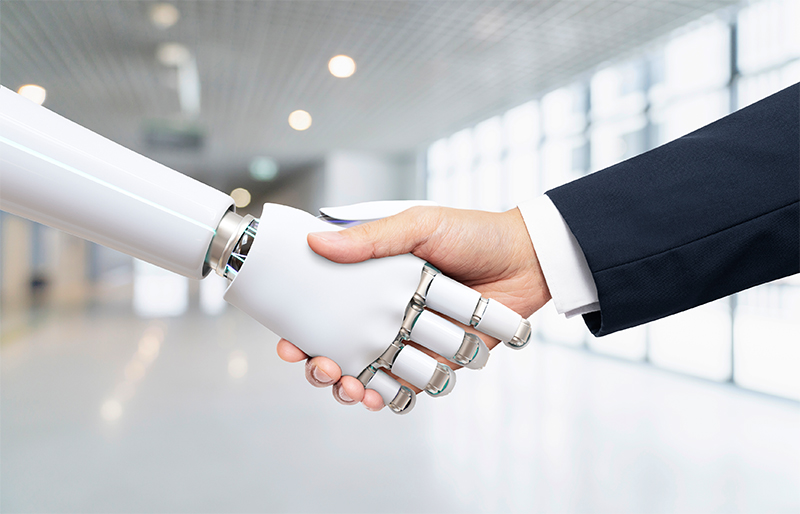We’ve taken the bull by the horns. 1902 Software has proudly built a growing portfolio of AI applications to streamline our internal workflow by embracing AI and its machine learning ecosystem.
Our focus has been on transforming, processing, and understanding data for tasks such as language comprehension, code generation, and similarity-based development—making sense of, for instance, several decades’ worth of our accumulated internal data.
Leveraging machine learning, natural language processing, data representation, and data retrieval, our teams have developed AI-powered custom applications, such as a chatbot assistant and innovative tools that generate smart meeting summaries, create tasks, and produce project estimates with just a click of a button.
We’ve optimistically explored the following AI concepts as the core of our AI-driven development:
LLM (Large Language Models)
LLMs are advanced AI models designed to understand and generate human-like text, including code. In software development, LLMs such as OpenAI’s GPT, can be used to interpret natural language prompts, generate code snippets, and assist in automating complex programming tasks.
- Benefits: This leads to faster code generation, enhanced productivity, and more consistent code quality, as developers can rely on AI to assist with writing code, documentation, and even debugging.
- Owtoo: At 1902 Software, we developed Owtoo, a smart AI assistant designed to streamline project management. Owtoo offers clients 24/7 access to project updates, reducing the need for direct communication with project managers. It also supports project teams—including managers, developers, designers, and QAs—by helping update tasks, manage schedules, and keep projects on track. Owtoo can retrieve information from documents, emails, project boards, and meeting transcripts, guide users through tasks, and analyze data from uploaded files. Additionally, it monitors client satisfaction, making it an invaluable tool for ensuring smooth project workflows.
Owtoo is powered by LLM and enhanced by Retrieval-Augmented Generation (RAG) for accurate, real-time responses. It excels in code review, detecting logical errors, security vulnerabilities, and performance issues, while also generating code based on user prompts. Owtoo integrates with project management systems to retrieve and manage tasks, issues, and deadlines, making it a valuable tool for streamlining workflows and ensuring accurate, up-to-date information. Designed for complex technical environments, Owtoo delivers real-time insights and automation.
As alternatives to the more famous OpenAI's ChatGPT, some companies use LLMs such as LLaMA 2, LaMDA, Claude, and BLOOM for goal-specific applications in dialogue generation, code assistance, multilingual translation, and safe conversational AI.
Embedding Models
Embedding models transform complex data, such as text or code, into numerical vectors that machine learning models can process. In software development, embedding models allow for the representation of code snippets, documents, or meeting transcripts in a way that highlights their relationships and similarities.
- Benefits: This boosts search and recommendation systems within a project, enabling developers to find relevant code, similar tasks, or related projects quickly, resulting in more efficient collaboration and knowledge management.
Technologies like OpenAI’s ChatGPT, Google Bard, Meta’s LLaMA, Perplexity AI, and Microsoft Copilot use embedding models to improve semantic search, content generation, and context-aware interactions for a variety of business and communication applications.
Code Models
Code models are specialized AI models trained on large datasets of programming languages, offering auto-completion, code generation, and debugging assistance.
- Benefits: This automates repetitive coding tasks, accelerates the writing of boilerplate code, and improves code quality by offering intelligent suggestions, thereby reducing the time developers spend on routine tasks and improving overall software reliability.
Tools using code models include GitHub Copilot, Codeium, DeepMind’s AlphaCode, PolyCoder, and GitHub Models, which support auto-completion, competitive programming, and multilingual coding assistance.

Vector Database
A vector database is designed to store and retrieve vectorized data, such as embeddings created by AI models. In software development, a vector database can store code snippets, task descriptions, and other project-related data, allowing for quick and efficient retrieval.
- Benefits: This enables faster similarity searches within large datasets, improving the ability to reuse code, track project components, or identify potential issues, ultimately making project management more streamlined and reducing time spent on searching for solutions.
Platforms using vector databases include Pinecone, Weaviate, Chroma, Faiss, and Qdrant, which are utilized for applications such as semantic search, recommendation systems, anomaly detection, and real-time AI-powered data retrieval in various industries like finance, healthcare, and e-commerce.
Vectorization
Vectorization is the process of converting complex data like text, code, or documents into numerical vectors that AI can easily process. Vectorization allows large codebases, meeting notes, or project documentation to be translated into formats that enable machine learning models to recognize patterns or similarities.
- Benefits: This enhances search, categorization, and pattern recognition within large projects, making it easier to identify recurring issues, related tasks, or code vulnerabilities, thereby speeding up problem-solving and decision-making.
Solutions enabling vectorization include Azure AI Search, Telnyx AI Platform, and machine learning frameworks like TensorFlow and PyTorch, which convert text, images, and audio into vectors for semantic search, recommendation systems, and other advanced AI applications.
Transformative business capabilities
When combined, these AI technologies can automate operations, personalize customer experiences, boost productivity, and deliver deeper insights. For businesses, integrating these solutions leads to reduced costs, improved decision-making, and more competitive digital strategies.
Imagine how AI can boost and optimize your business.
Let’s kickstart your AI journey today!
Ready to take your business to the next level with AI solutions tailored specifically for you? We’re not just your tech partner—we’re collaborators in driving AI innovation. Our approach is simple: we dive deep into your business, understand your challenges, and craft AI-powered solutions that don’t just meet your needs—they scale with your growth. Got an idea for an AI tool that could transform your operations?
Let’s make it happen. Reach out, and let’s build something game-changing together.